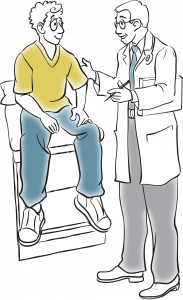 Prostate cancer is the second leading cause of cancer deaths in American males, yet the question of whether or not men should be screened for the disease is surprisingly controversial. Some medical associations believe that potential testing risks, such as false positives, may outweigh its benefits.
Prostate cancer is the second leading cause of cancer deaths in American males, yet the question of whether or not men should be screened for the disease is surprisingly controversial. Some medical associations believe that potential testing risks, such as false positives, may outweigh its benefits.
Early stages of prostate cancer usually show no symptoms, but more advanced stages can cause serious problems such as difficulty urinating or loss of bladder or bowel control. Most males who experience these symptoms likely have something other than prostate cancer, but even so, it’s crucial to share any signs with a physician as early as possible.
To decide if you should be tested for prostate cancer, have a conversation with your family doctor. Discuss screening pros and cons as well as your family history, lifestyle, and any symptoms you may have. If you do decide to be tested for prostate cancer, you might receive a prostate-specific antigen (PSA) screening or a digital exam.
The question of when to be tested for prostate cancer will vary from person to person. The American Cancer Society recommends being screened around the age of 50 in most cases, though those with a family history of prostate cancer may consider being screened earlier. Please check your summary plan document for specific test recommendations and benefits under your plan.
Basic Prevention Reduces Prostate Cancer Risk.
Use these tips to stay healthy and reduce your risk of prostate cancer
- Choose a healthy diet. Fruits and vegetables should be eaten daily to keep you healthy.
- Maintain a healthy weight. If you need to lose weight, ask your doctor for help creating a healthy plan.
- Exercise most days of the week. There is some evidence that men who exercise may have a lower risk of prostate cancer.
- Reduce dairy intake. Men who consume more dairy are at a higher risk.
- Choose healthy foods over supplements. Supplements haven’t been proven to reduce your risk of prostate cancer.
- Talk to your doctor. This is especially important if you have a higher cancer risk.
